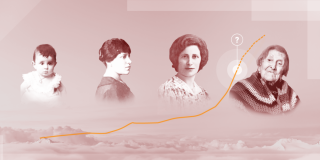Human Longevity -- A Controversial Topic
"We just don't know what the age limit might be. In fact, by extending trend lines, we can show that maximum and average lifespans could continue to increase far into the foreseeable future."
"Whether it was luck of their genotype [that has people not] hanging in, staying alive despite disease. They just didn't get sick; that can be a debate. But the fact is that, mostly the people who live a very long time, they were always healthy. They didn't have heart disease or diabetes."
"If this trend [average lifespan goes up] continues and our life expectancy of the average person becomes 100, the longest person might make it to 150."
"Probably not you or me. But maybe our grandchildren and great-grandchildren, because it's an ongoing process."
Siegfried Hekimi, professor of experimental biology, McGill University, Montreal, Quebec
"From now on, this is it. Humans will never get older than 115."
"Further progress against infectious and chronic disease may continue boosting average life expectancy, but not maximum lifespan."
Jan Vijg, Einstein expert on aging, Albert Einstein College of Medicine, Bronx, New York City
"So, people are moving into age 120, but we have no idea where that will end."
"Will these people continue to live longer and longer, or is there a certain limit to life expectancy? I think it's an open scientific debate."
Parminder Raina, scientific director, McMaster Institute for Research on Aging, Hamilton, Ontario
 |
| Emma Morano passed away last April. At 117 years old, the Italian woman was the oldest known living human being. McGill Newsroom |
Professor Hekimi and co-author Brian Hughes have found fault in the journal Nature-published study out of Albert Einstein College of Medicine where researchers analyzed data retrieved from people who lived to 110 or older between 1958 and 2006 in the United States, France, Japan and the United Kingdom to reach their determination that past 115 years of age the world is not likely to see a future of supercentenarians older than that. It was their studied conclusion that 115 represented the end of the journey for humankind's life expectancy.
People, they were convinced, who at the present time reach 110 do so with no greater life expectancy in the long term than their predecessors who lived to that grand old age in the 1970s. The age of death of the world's oldest had not increased since 1997 when the oldest documented person who ever lived, Jeanne Calment, died at age 122. It was, however, a conclusion that these two Canadian researchers held in doubt, despite its celebrated worldwide sensation.
Their paper also published more currently in Nature, pointed out what they perceived as a flaw in the analysis brought to bear by the Einstein group on the limit they set for supercentenarians, arguing as they did that the maximum human lifespan has plateaued. Work conducted with worms and mice in Professor Hekimi's laboratory has demonstrated that a single alteration in the smallest piece of DNA of nematode worms allows the animals to live five times longer than normal. Their research, they feel, could at some future date allow scientific interventions that would slow down the human biological aging rate.
Professor Hekimi feels that in the future it is entirely possible that people could live to 150, or even longer. And not, he emphasizes in poor health, citing observational studies of centenarians that demonstrate that a category of individuals somehow manage not to become ill with the body breakdowns that plague us in old age. He foresees that an increased lifespan goes hand in glove with a longer, healthy lifespan. Jeanne Calment, despite her extended lifespan became blind and hard of hearing, had mild heart failure and rheumatism, but was reported to be in good health before she died.
"It was obvious to me this was a weak analysis", Professor Heikimi states of the Einstein study published in October when the biological human life limit was placed at 115 years. That study pointed out that there was a steady increase between the 1970s and early 1990s of supercentenarians' longevity, but that around the year 1995 that kind of life expectancy came to a sudden plateau and stayed there. Their conclusion centered around their belief that there is no greater life expectancy for people reaching 110 today than those who lived back in the 1970s.
The two McGill researchers are critical of the Einstein team decision to split data into one group before an arbitrary date and a second one after that date. They chose themselves not to divide the data set and discovered a long-term increasing trend did in fact manifest in maximum life expectancy, and saw no evidence of the increased trend stalling. The life expectancy of Canadians since 1867, the year of Confederation, has more than doubled to 82 (80 for men, 84 for women). It is reasonable, says Professor Hekimi that maximum lifespan follows a like trend.
There were 8,230 centenarians accounted for in the 2016 Canadian census, representing a 41 percent increase over figures gathered in 2011. Currently North Bay resident Ellen Gibb is the oldest Canadian supercentenarian alive, having greeted her 112th birthday this past April.
 |
| The Fountain of Youth by Lucas Cranach the Elder, circa 1546 |
Labels: Biology, Controversy, Life Expectancy, Research

0 Comments:
Post a Comment
<< Home